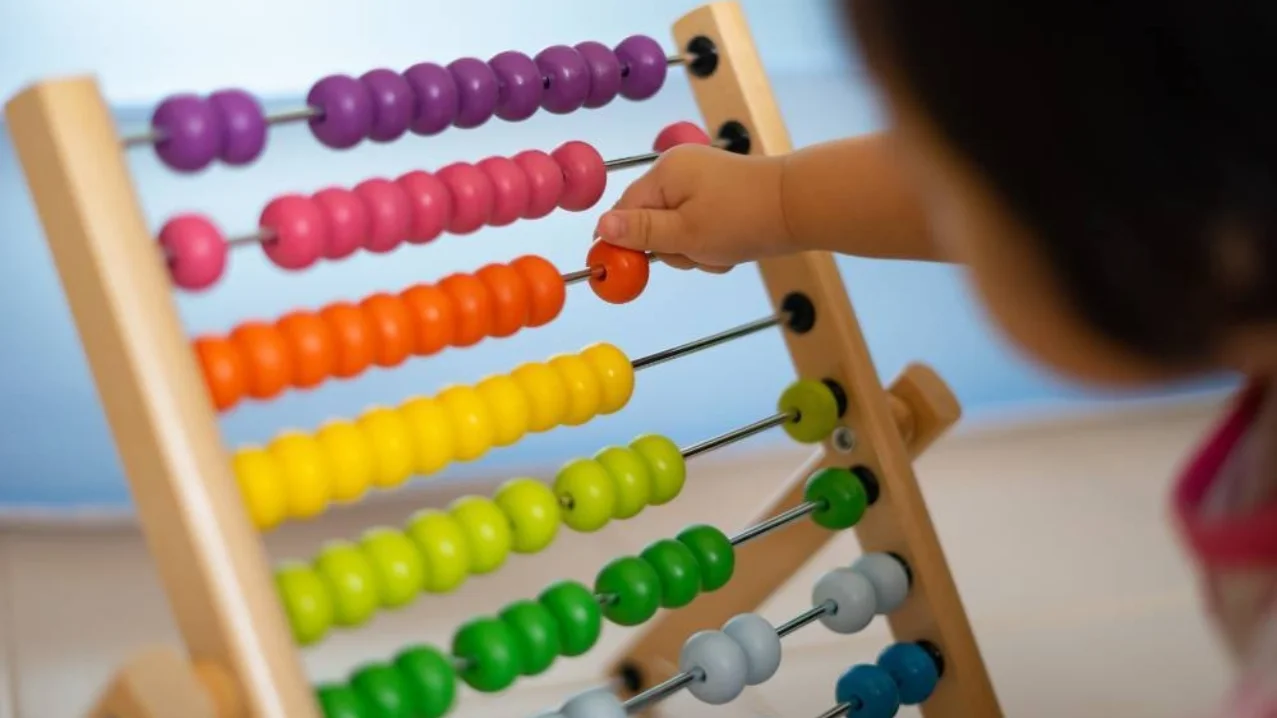
Math Learning Program
What is Numeracy?
Numeracy (knowledge of numbers) is the foundation for all early mathematics understanding, computation, and reasoning; it includes counting, one-to-one correspondence, number sense (the ability to reason about numbers and operations), and understanding the function of written symbols for numbers. Literacy and numeracy are the two primary academic subjects for young children, and so they are a core part of Grace Community School’s College Can Begin at 2 Curriculum.
Numeracy starts with using counting to understand cardinality (the property that a collection has a number of members); understanding the one-to-one relationship between numbers and quantities, and being able to comprehend symbolic representations of numerical values. Early number skills include recognizing, representing, and ordering numbers, as well as counting objects and understanding how to solve simple problems.
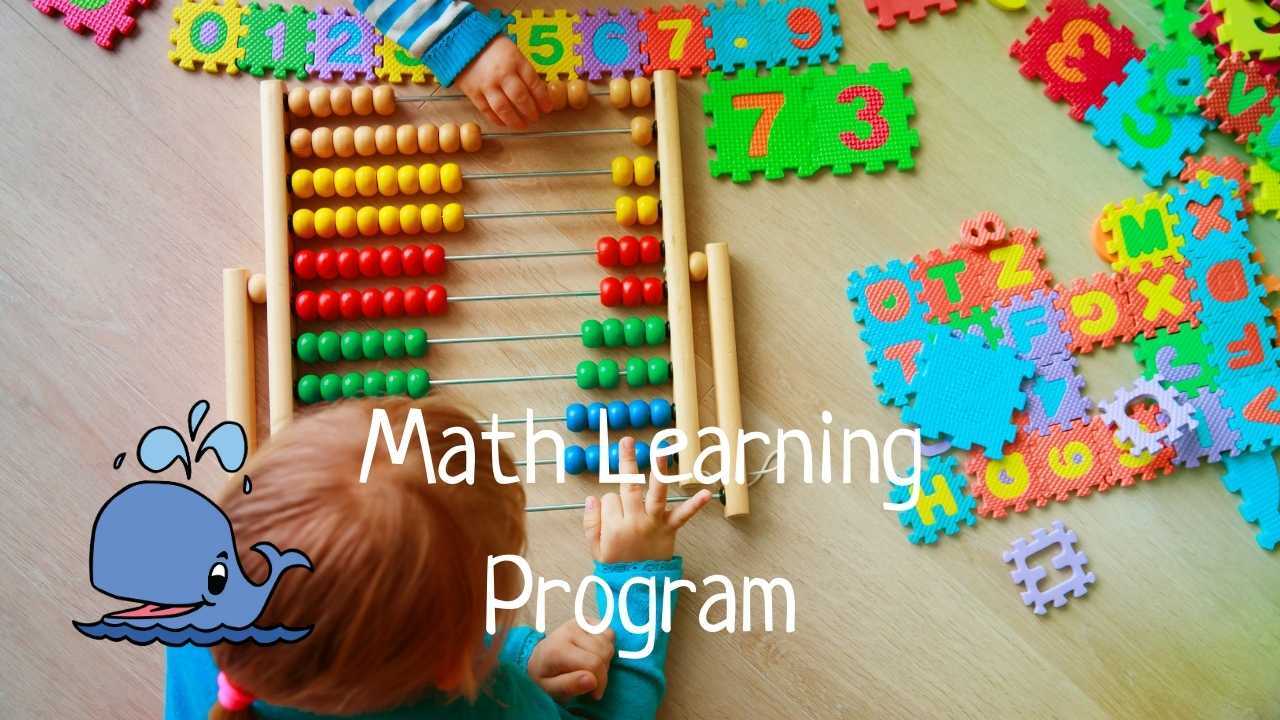
The abacus is an ancient counting tool that is still used today to teach children about numeracy. By sliding beads along rods, children can learn about place value, addition, subtraction, multiplication, and more.
Recognizing the value of a collection of objects is an early skill that is foundational to all knowledge of numbers and basic arithmetic. Children with good early numeracy skills can identify which collection has more items, even when the collections vary in size or contain different types of items. Children who understand this early relationship between number and quantity will be able to perform the earliest arithmetic operations of addition and subtraction with single-digit numbers
In order for children to understand the written symbols for numbers and be able to perform addition and subtraction, they must have a strong understanding of one-to-one correspondence. Numeracy encompasses being able to comprehend and reason about numbers and arithmetic operations, as well as using these skills to solve problems.
The more math can be incorporated into children’s everyday interactions, the better they will understand and use math in their everyday lives. Showing children how math is used in the world around them, playing number and counting games with them, and having conversations about numbers, can all help build their numeracy skills.
The Benefits of Early Numeracy Instruction by Early Childhood Educators
Early numeracy skills build a strong foundation for mathematics learning and thinking throughout life. Building early numeracy helps to improve future mathematical reasoning and problem-solving ability, which in turn is linked to positive social outcomes such as higher academic achievement in reading, science, and social studies.
Early numeracy also lays the foundation for future mathematical learning by giving children confidence in their number sense, because it establishes a positive attitude towards math and an understanding of the value of mathematics. This is important because studies have shown that students’ attitudes toward mathematics can influence their success in math classes throughout school. Our goal is to break down the misconception that math is difficult or uninteresting. In reality, math can be enjoyable and has a wide range of practical applications.
The College Can Begin at 2 Curriculum helps young children develop their foundational skills in number sense and numeracy. The purpose of this program is to help children build a solid foundation in early math skills, which is the foundation for future mathematics learning.
There is significant research that supports teaching early numeracy skills like counting, cardinality, number sense, sequencing, and geometry to young children. Studies have shown that when children are provided with formal mathematics instruction during their preschool years, they are much more likely to succeed in school at much higher rates than their peers who do not receive such instruction.
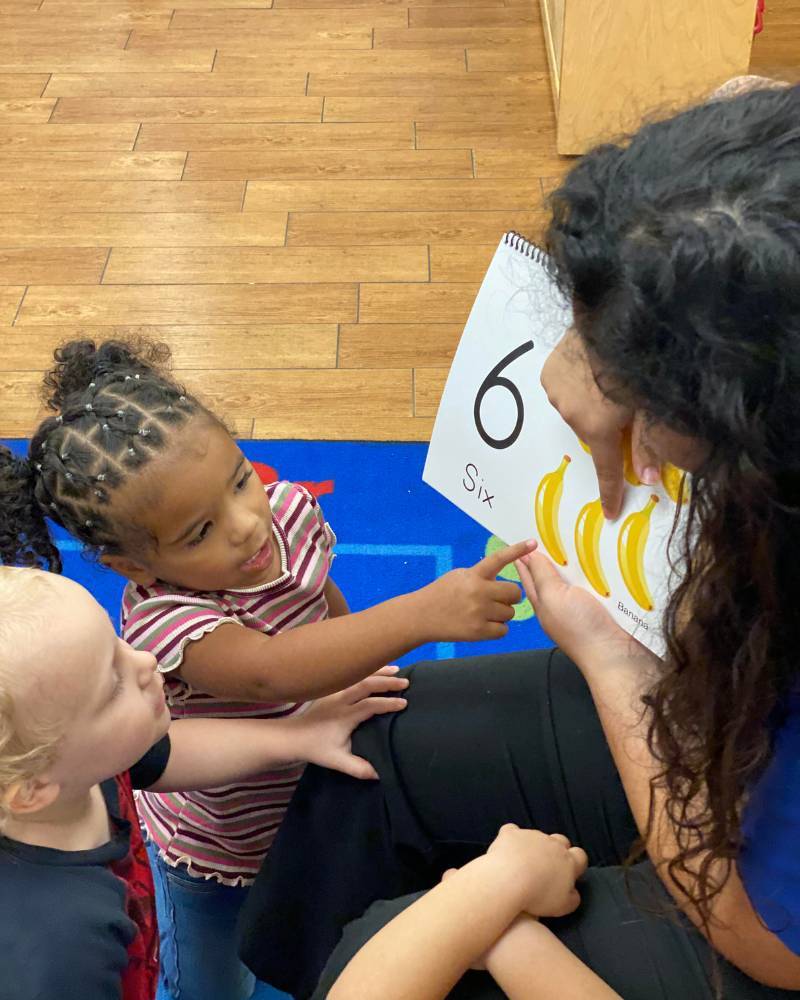
Our early numeracy program creates a base of understanding so students are better prepared to learn how to count, do basic addition, subtraction, multiplication, and division at school. It also helps them to better understand the foundations of geometry and shapes.
Research suggests that children with a strong foundation in early numeracy skills are much better equipped to begin learning more complex mathematics concepts.
What Does Grace Community School’s Math Instruction Program Look Like?
Children all learn differently, so our math program allows kids to learn at their own pace. We make our math lessons fun and engaging so that even the most reluctant learners are willing to participate in mathematical activities. Our teachers take learning opportunities when they present themselves, whether that be on the playground, while potty training, at lunch, or during free time. Our teachers are able to utilize these teachable moments to help students learn important math skills. Our classroom schedules allow activities to change every 10-15 minutes to keep kids from getting bored.
Our teachers often integrate music and movement into their lessons to better engage all types of learners. Teachers also use hands-on learning opportunities for children who learn best through tactile activities.
We build a strong foundation in number sense, counting, addition, and subtraction. We also provide children with both hands-on and paper-and-pencil activities to work with numbers in different ways.
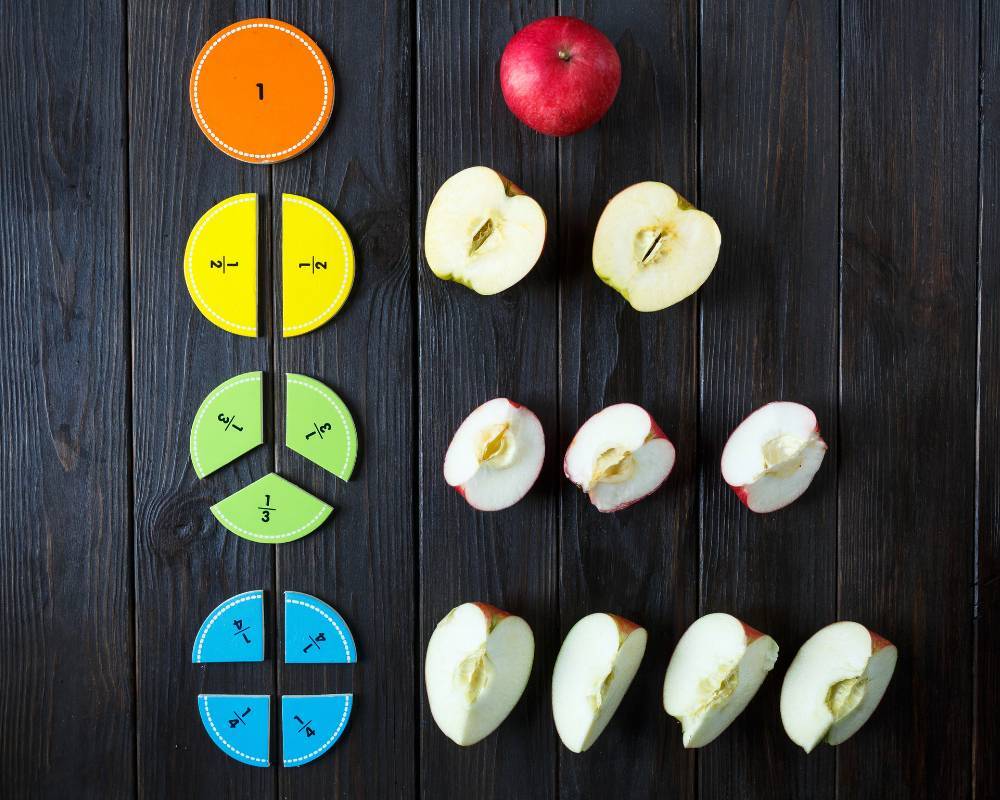
Everyday activities can teach early numeracy. For example, by cutting apples into equal parts, kids can visualize and understand mathematical concepts like halves, quarters, and eighths. This hands-on approach to learning can help children grasp fractions more easily and build a strong foundation for future mathematical understanding.
The lessons begin with basic counting activities and gradually increase in difficulty, culminating in understanding how symbolic representations of numbers (i.e., written numerals) encode quantity.
The lessons are designed to be inquiry-based, allowing for children to discover mathematical concepts on their own, as well as teacher-directed. Preschoolers learn by experimenting with objects (such as cups and spoons), playing games (ranging from classic board games like Uno, Memory/Concentration, and Bingo; to card games like Go Fish; to hands-on games like Hot Potato), doing art activities (such as making patterns with string, beads, twigs or buttons; drawing bubble maps to demonstrate quantity); engaging in sensory play (such as counting bowls of rice or pasta noodles to reinforce the number sense lesson). Fun learning activities from our preschool theme weeks keep activities fresh.
We want to help children see that math can be fun and creative. Children are encouraged to use their creative skills with math, whether that means playing games with friends and family members or coming up with creative ways to solve problems in everyday activities.
Much of our math instruction is done during “Math Circles.” (See also: What are Reading Circles?) Numeracy is one of the most important skills to learn. It’s an essential building block for math and science classes, getting a job down the road, and even life in general. As part of our commitment to giving our students the best education possible, our math curriculum gets kids excited about numbers. Our program is perfect for children of all learning styles and abilities, and it makes learning fun! Just as early literacy helps build phonological awareness, literacy skills, and general language abilities; early numeracy instruction helps children develop math fluency and confidence. We want to make sure our students are set up for success, which is why we believe in the importance of early numeracy instruction.
The math program at Grace Community School provides a well-rounded learning experience that allows your child to explore their natural talents and discover a passion for mathematics.
As children progress through the math levels and learn new skills and concepts, they take home certificates showing parents what they have learned.
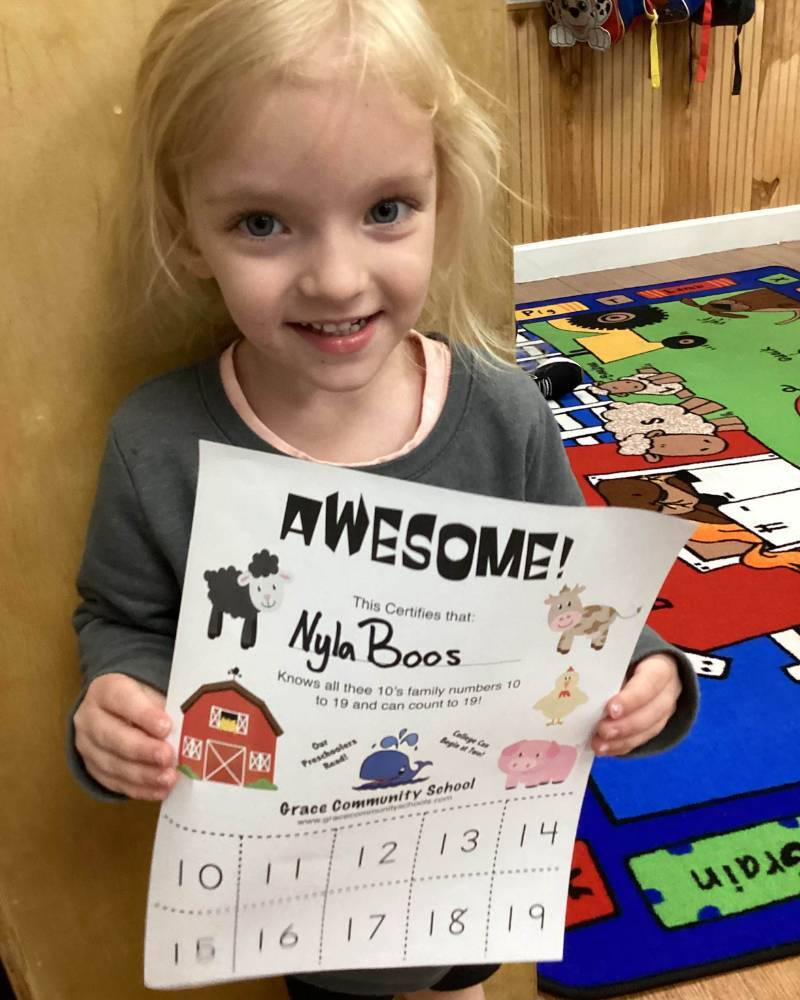
Our students learn their shapes and colors, how to count, make patterns, and more — but they’re having so much fun at the same time! They spend hours playing fun math games that are designed to help them master important math concepts and build practical skills that will help them in their everyday lives as they get older and set them up for later achievement as they start school. Our early years instruction has a particular focus on counting skills.
Concepts Covered in Our Math Curriculum
Preschool Math Concepts
Topics covered and skills taught in the preschool math levels include:
- Basic shapes and simple 2D geometry, sorting shapes by property (e.g., color, area, height; length; width; angle), making larger shapes from smaller pieces (like making rectangles from squares, etc.)
- Advanced shapes and 3D geometry
- Number and quantity: Recognize and name numbers through 50, understand quantities, more or less.
- Math vocabulary, word problems.
- Measuring: length, width, introducing units of measurement like inches, feet, pounds, kilograms.
- How math is used in science and engineering.
Identifying and creating patterns, repeating patterns (e.g., ABCD) - Counting & cardinality: Counting on/back at 5s, 10s, or 1s to match sets, counting sets of objects (e.g., 2 cars and 3 blue cars), using numbers to describe quantity (e.g., three quarters is 25 cents; four eggs).
- Simple addition & subtraction: Add 2 and 3, take 1 from 8 using manipulatives, etc.
- One-to-one correspondence: Using one-to-one counting to match sets of objects (or numbers), making sets of objects once & only once using ten frames, grids, 10-beads.
- Sorting: Sorting by color, size, shape; grouping shapes based onhttps://empoweredparents.co/how-to-teach-your-child-one-to-one-correspondence/ a common characteristic (e.g., green circles and blue triangles).
- Developing Number Sense: Understanding quantities first up to five items and then understanding the quantity of more than five items (e.g., starting with two sets of 5 shapes, he/she must group them into groups of 4 shapes; then understanding that it takes 7 sets to make 3 groups of 4; then 8 sets to make 2 groups of 6, etc.).
Kindergarten Math Concepts
Topics covered and skills taught in the kindergarten math levels include:
- Number and quantity: Understand numbers up to 100.
- Math vocabulary: Mathematical symbols (e.g., + or –), word problems.
- Patterns & shapes: Identifying more advanced patterns
- More advanced addition and subtraction: how to add three 1-digit numbers together, adding 2 digit numbers together.
- Geometry: Shapes & shapes’ properties, introducing the concepts of volume and area.
- One-to-one correspondence: Using one-to-one counting to match sets of objects up through 100.
- Counting on/back (“before” and “after” numbers) up through 100.
- Counting by 2’s, 5’s, 10’s, and 25’s (including using money).
- Money: pennies, nickels, dimes, and quarters; understanding the concept of currency, giving change.
- Graphing: Identifying given data and constructing a bar graph to represent that data; different kinds of graphs and charts.
- Number lines: Understanding the number line, where positive numbers are on the right and negative numbers are on the left; using number lines to solve problems
- Learning about clocks and telling time: Telling time to the hour, half-hour, and quarter-hour (15-minute increments) using analog & digital clocks.
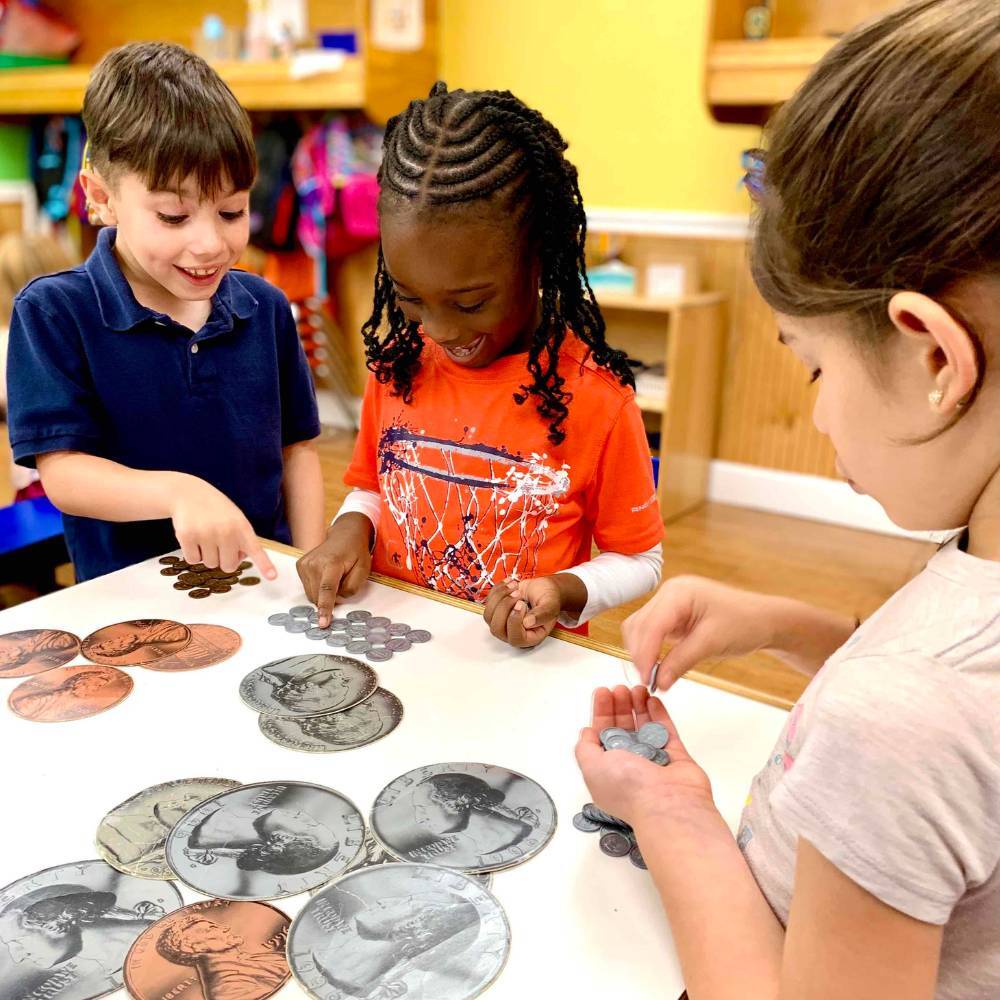
Preschool children engaged in a counting and money practice activity, which is an excellent way to develop early numeracy skills. By using colorful and tactile materials like coins and bills, kids can learn about basic mathematical concepts like counting, addition, and subtraction. This hands-on approach to learning is both fun and effective.
Preschool Math Activities
We teach our students numeracy by helping them count, identify and sort objects. We also encourage the teaching of math concepts through play sessions, projects, and games organized with a purpose so that it is fun for the kids. Math activities in preschool include counting fruit, sorting household items into categories, playing with shape sorters, and identifying shapes. We can also teach numeracy using games like jacks, tag, and hopscotch.
We constantly engage our students in different activities related to math so that they develop an early interest in the subject. We expose them to many math concepts through hands-on experiences, rather than strictly formal lessons where we tell them what they should do with their learning. But flashcards and drill times are still important, of course.
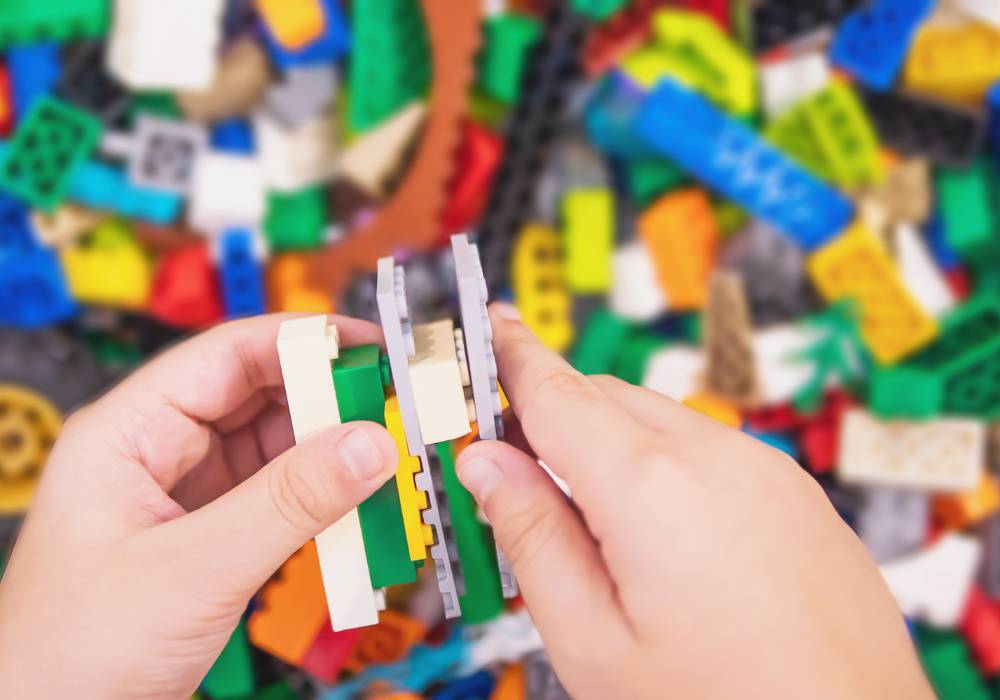
Building Legos helps children develop early numeracy skills by exposing them to concepts such as counting, sorting, patterns, and shapes. It’s a fun and engaging way for kids to practice mathematical thinking and problem-solving.
For example, in an organized activity meant to teach numeral identification, we show our students cards with different numbers on them and ask them to put the same number of dots over each respective card’s number of stars. This sort of activity helps us teach our students not only how to identify numbers, but also the concept that the more stars there are on a card, the higher its number value.
We also organize activities to teach students about the relative value of numbers. For instance, we get them to make groups of objects and take turns picking up an object, showing it to his or her group members, and then placing it back in the original place. The student who has picked up the last object is the winner. This gives our students a sense of the relative value of numbers in terms of how many objects they can group together in order to win.
In teaching numeracy skills, we focus on helping children develop an understanding of numbers and their function in the world around us. We also give them a feel for the relative value of numbers to help our students learn and understand different math concepts and strategies.
While this may seem obvious, there are many parents who do not realize how important it is for their child to learn math skills as early as possible.
Numeracy is very important for the development of the child’s cognitive skills, which are vital to his or her future success. It can also help students learn other subjects easier and develop a lasting interest in learning. Math is fun at Grace Community School!
Why Are Early Math Skills Important?
Math skills are a key aspect of school readiness, much like language skills. At a young age, children begin developing skills that will set the stage for later academic achievement. For example, even kindergarten children are expected to be able to count objects. Counting skills, developed in the early years of life, can be a significant predictor of how well a child does in later years of school.
Cognitive psychology says human infants are born with the capacity to solve basic math problems. But this innate ability is only as strong as the early learning experiences he or she gets. That’s why it’s important for parents and teachers to provide children with explicit instruction on numeracy concepts and skills, such as number recognition, counting objects, addition, subtraction, multiplication, division, fractions and more.
According to research, school-age children are expected to be proficient in math skills by the third grade. However, for children who struggle with math in early years, it can be a significant predictor of needing early interventions for mathematical difficulties or other learning disabilities.
To ensure success in math, the early years learning framework recommends that preschool teachers introduce math concepts and activities as early as possible. Research suggests that starting at a young age will help solidify foundational math concepts, helping children better understand more complex math. This benefits visual spatial working memory, which is a key factor in developing maths skills.
We go beyond simply teaching numbers and counting and focus on providing meaningful experiences that help our students understand the relative values of numbers, operations, analyze group differences, and learn important math talk.
Quality early childhood research also emphasizes the importance of providing activities that allow children to explore numbers with concrete materials and objects. This helps them understand abstract mathematical concepts, such as the relationships between numbers and operations. When introducing new topics, teachers should provide clear instructions along with numerous examples for children to replicate on their own. Most children learn best through active exploration and experimentation.
Practical Numeracy Skills
Early childhood educators understand the importance of incorporating practical numeracy skills into the curriculum. Our focus on early childhood development ensures that we lay a strong foundation for our students’ future mathematical knowledge.
As part of our commitment to enhancing preschool children’s mathematical knowledge, we engage them in activities that promote early mathematical learning and numeracy development. Our teachers utilize math talk, which involves using mathematical language to describe and explain concepts, to deepen the understanding of early mathematical skills in our young learners.
In early childhood, math learning plays a crucial role in building a strong foundation for later academic success. By equipping our preschool children with essential maths skills, we prepare them for more advanced mathematical concepts they will encounter in later years.
One key aspect of early numeracy development is noticing patterns in the world around us. Many children are naturally drawn to patterns, and our teachers encourage this curiosity by introducing activities that require students to identify, create, and extend patterns.
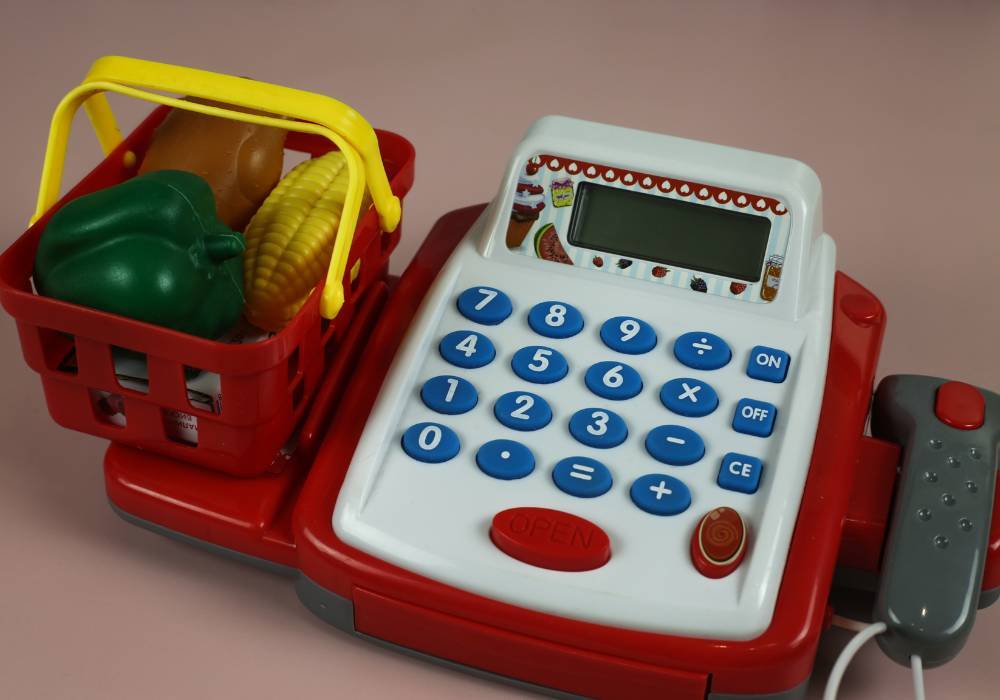
Playing with a toy cash register can help children develop specific early numeracy skills such as counting, addition, subtraction, and identifying currency denominations. As kids engage in role-playing activities, they learn about basic math concepts in a fun and interactive way, building a strong foundation for future mathematical understanding. In addition to developing numeracy skills, playing with a toy cash register can also support other aspects of a child’s development. For example, children can develop social skills like communication, cooperation, and empathy as they take turns playing different roles in a store. They can also improve their fine motor skills as they manipulate coins and bills, enhancing hand-eye coordination and dexterity.
Counting objects is another fundamental skill that promotes numeracy development in early childhood. Our students practice counting with a variety of objects, learning one-to-one correspondence and improving their reasoning skills. Through engaging activities, we help children develop their spatial sense, which is vital for understanding geometry and measurements.
By incorporating mathematical language into our daily interactions with preschool children, we foster a deeper understanding of mathematical concepts and help students feel confident in their abilities. Our teachers are skilled in asking open-ended questions and providing opportunities for students to explain their thinking, which further strengthens their reasoning skills.
In summary, Grace Community School’s emphasis on practical numeracy skills in early childhood education ensures that our students develop a strong foundation in mathematical knowledge. Our program incorporates math talk, early mathematical learning activities, and a focus on numeracy development to help students build essential early mathematical skills. By nurturing our students’ innate curiosity and supporting their learning, we prepare them for future success in mathematics and beyond.
Learning Mathematical Thinking
We recognize the importance of fostering mathematical thinking in our students from an early age. Developing mathematical knowledge and early numeracy development are crucial to ensuring that children are well-prepared for school entry and beyond.
In addition to building literacy skills, our curriculum focuses on teaching maths concepts that will help students succeed in their early school years. By integrating general vocabulary knowledge with mathematical ideas, we provide a comprehensive learning experience that supports math success in elementary school.
Our program is designed to nurture kindergarten children’s ability to think critically and engage with math concepts. We encourage students to explore mathematical ideas and develop their working memory, which is essential for solving problems and understanding complex concepts.
In the early stages of learning, we introduce our students to various math concepts through hands-on activities and engaging lessons. As children progress, we continue to support their growth by presenting more challenging mathematical ideas that require higher levels of thinking and problem-solving skills.
By providing a solid foundation in mathematical thinking, we prepare our students for success in the early school years and beyond. Our comprehensive approach to teaching maths concepts ensures that our students develop the necessary skills to excel in elementary school and further develop their mathematical knowledge throughout their academic journey.
How You Can Help Your Child’s Math Development
Your child’s preschool years are a great time to further his or her math skills. You can help your young children learn number sense, the concept that “more is bigger” and “less is smaller,” which younger children have already been exposed to in their lives. It is important for them to know this so they will understand numbers better as they get older and move into higher grades.
In addition, you can provide your child with supportive learning activities. Puzzles and board games are great for developing math skills since they allow children to think logically and strategically. Counting objects or playing number games is also a fun way to help kids understand numbers and practice counting.
You can also use everyday tasks like baking or cooking as an opportunity to introduce basic mathematical concepts to your child, such as measuring ingredients or reading recipes. Additionally, show them how money works by teaching them the values of different coins and bills so that they have a better understanding of financial concepts.
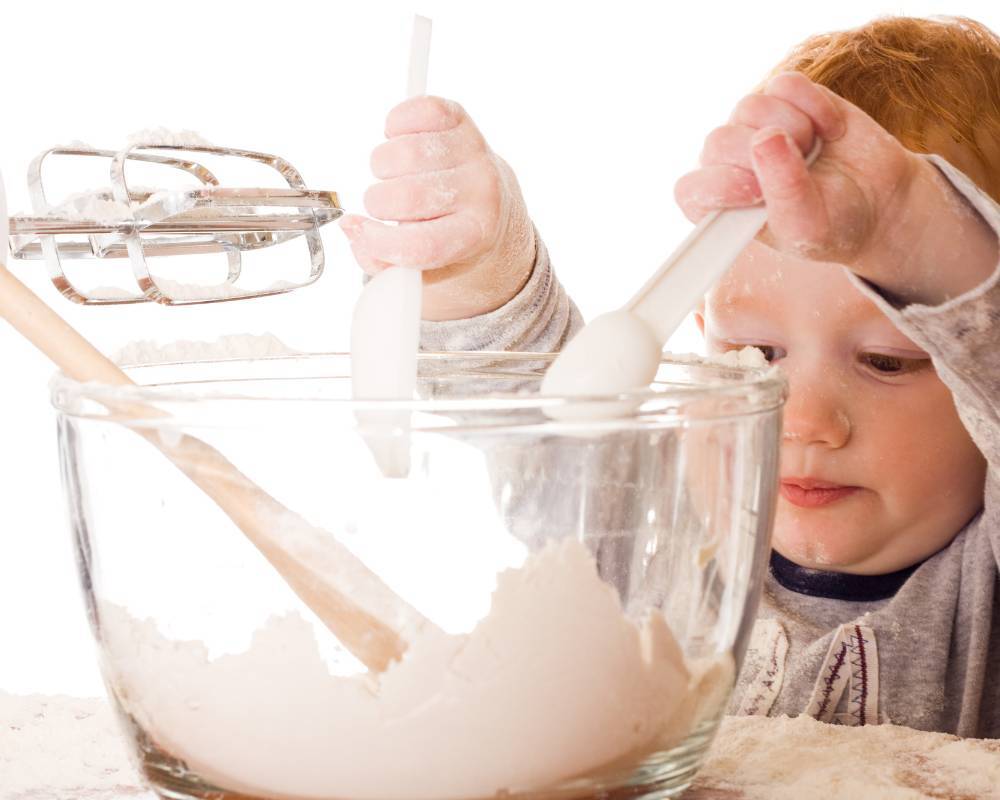
In addition to creating delicious treats, baking offers a fantastic opportunity to develop important numeracy skills. By measuring and weighing ingredients, children can learn about units of measurement, fractions, and basic arithmetic.
By supporting your child’s learning journey with these activities, you will be helping him or her develop the necessary mathematics skills needed now and in the future.
Math Activity Games You Can Play at Home
You can help your child learn these concepts by playing games like:
- Color Count: Have a bag of colorful objects (such as buttons, Easter eggs, jellybeans, etc.) and show your child how to pick out one item at a time while counting each object. Then have him or her add the items to see how many are in the bag. After your child counts them, have her or him put all of the objects back into the bag and mix them up to start over again.
- How Tall?: Give your child a few teddy bear figurines or other small toys to represent people. Have him stack them next to each other while you measure how tall they are. Then have him or her remove one of the figures until there are none left to represent how tall the people would be if some were missing.
- Seek and Find: Do a “seek and find” activity by putting 10-15 objects in plain sight around the room, such as socks, shoes, toys, etc. Have your child close his or her eyes and count out loud while you hide a few of the objects. After you’ve hidden them, have your child open his or her eyes and look for them. If needed, touch each object as you count it aloud together.
- Number Line: You can make a number line on your own using a strip of paper and markers or crayons. Make small marks along the paper to represent numbers, beginning with one on the side closest to you. Let your child move up the number line by counting each mark aloud while moving his or her finger from left to right after each count.
- Number Recognition: If you give your child a deck of playing cards, you can practice number recognition. Teach your child the names of each card and let him find them in numerical order.
- Number Bonds: Make a number bond mat by drawing three rows with five columns on it, then fill in each column based on what numbers add up to 10 (e.g., 1 + 9 = 10, 2 + 8 = 10, etc.). Have your child follow the pattern by placing a stone or other marker on each spot where the numbers match.
Enjoy helping your child learn these important math skills!
Conclusion
In conclusion, numeracy is the ability to read, write and perform basic math tasks. Children learn these skills easily with help from parents and teachers in a safe and loving environment at Grace Community School. Early numeracy will help children develop cognitive skills which can give them future success in life. Mathematical games are a great way to have fun while learning early numeracy.
We’d love to see you at Grace Community School and help your child with his or her educational journey. If you’d like Grace Community School to help your child build early numeracy skills, let us know!